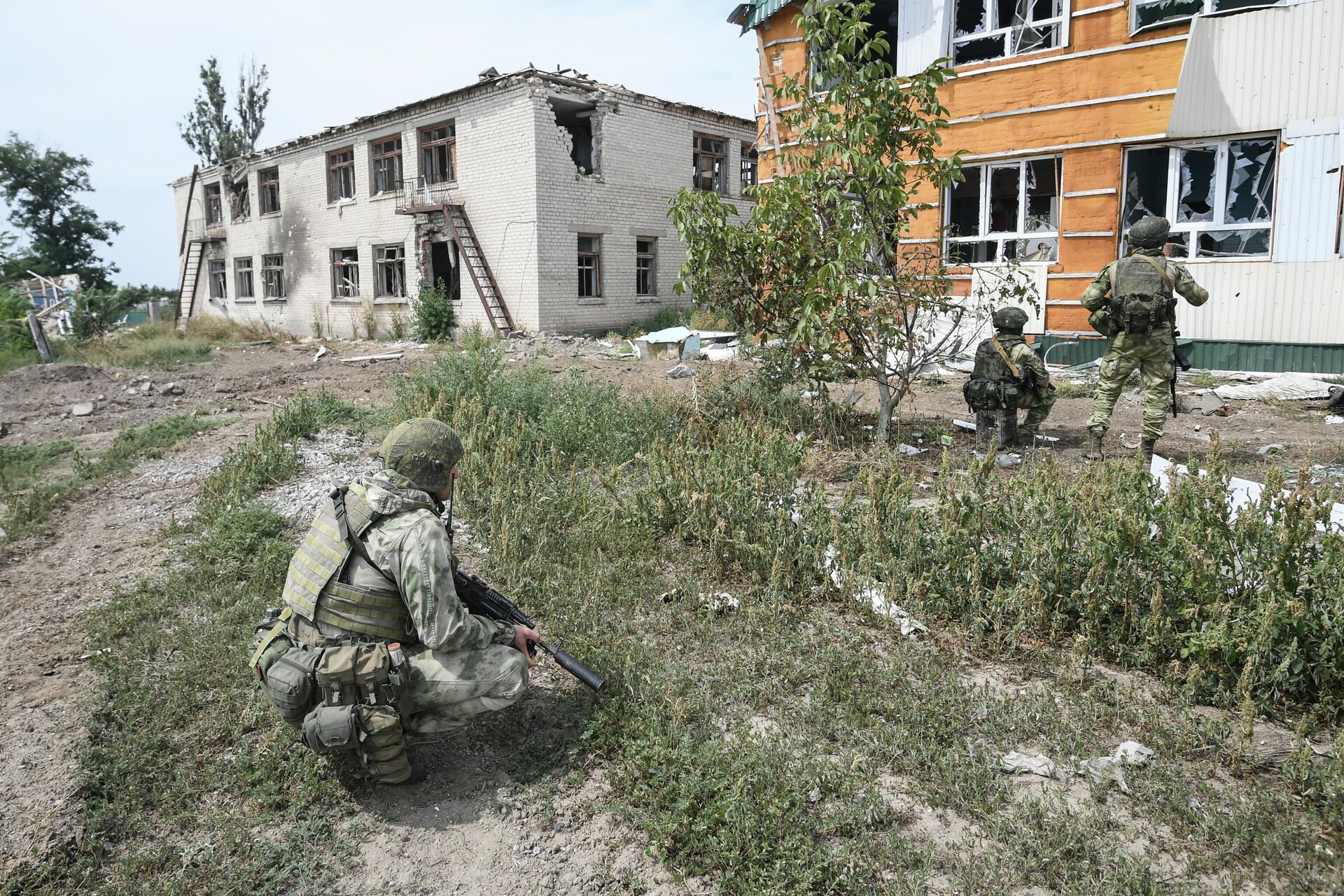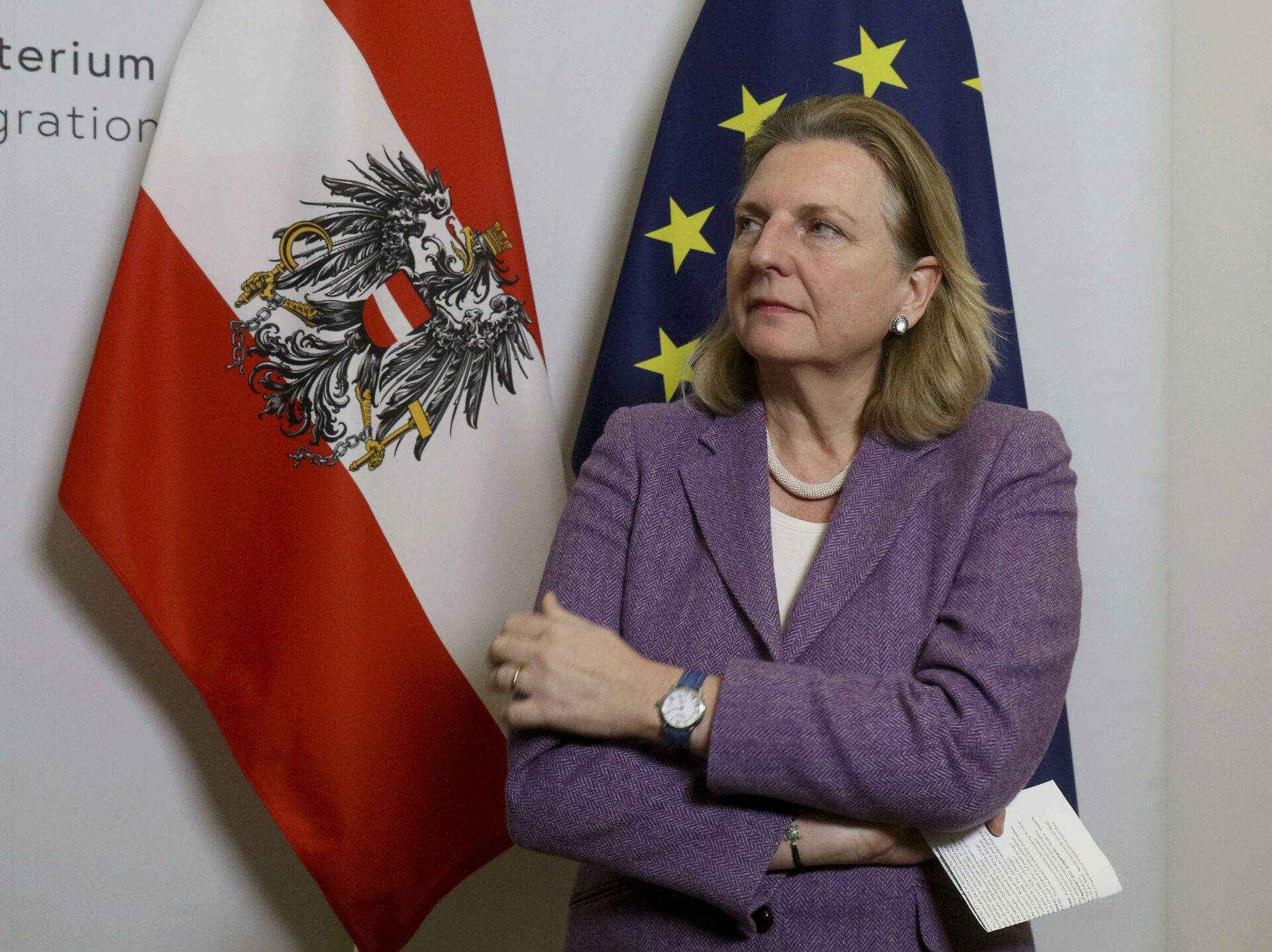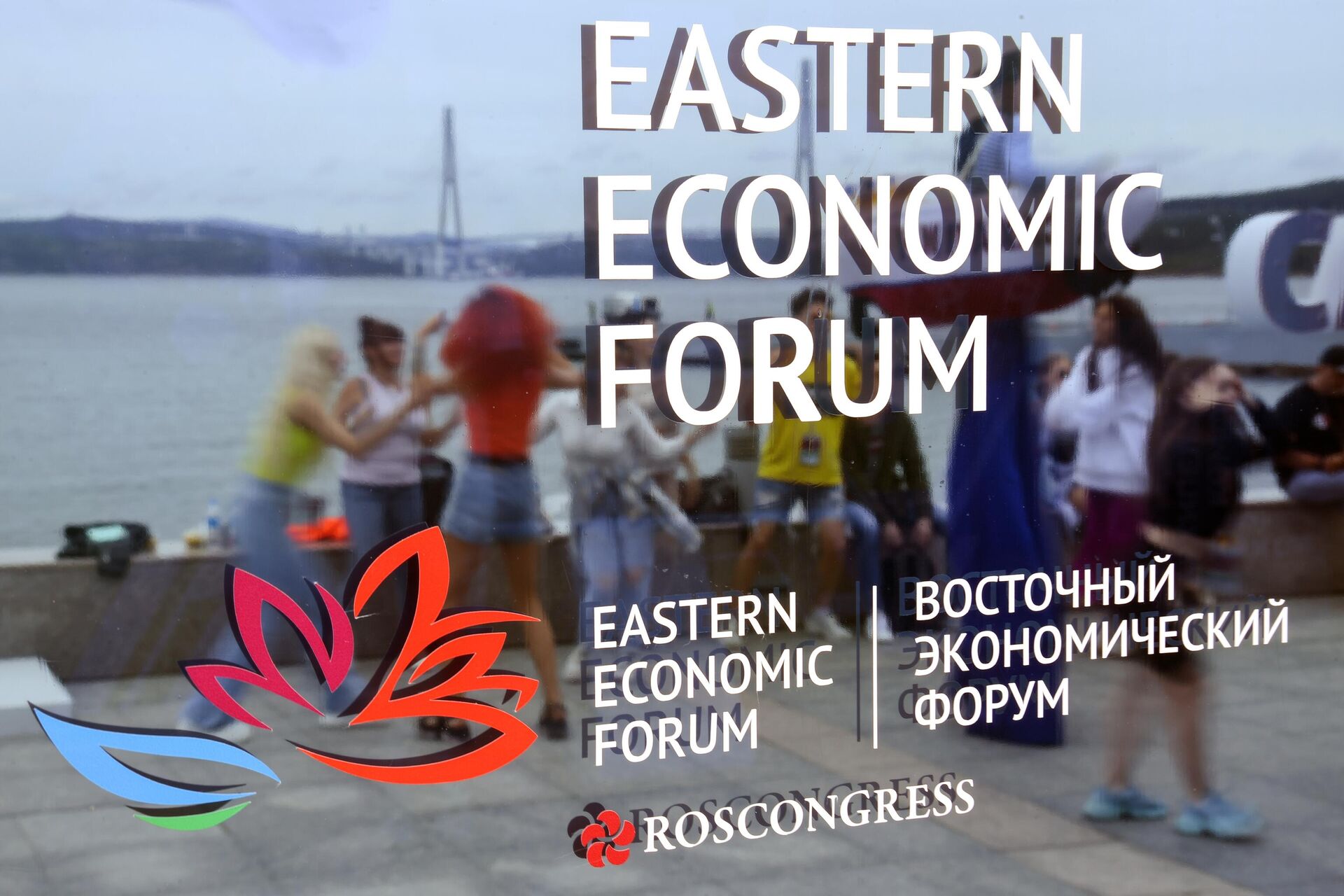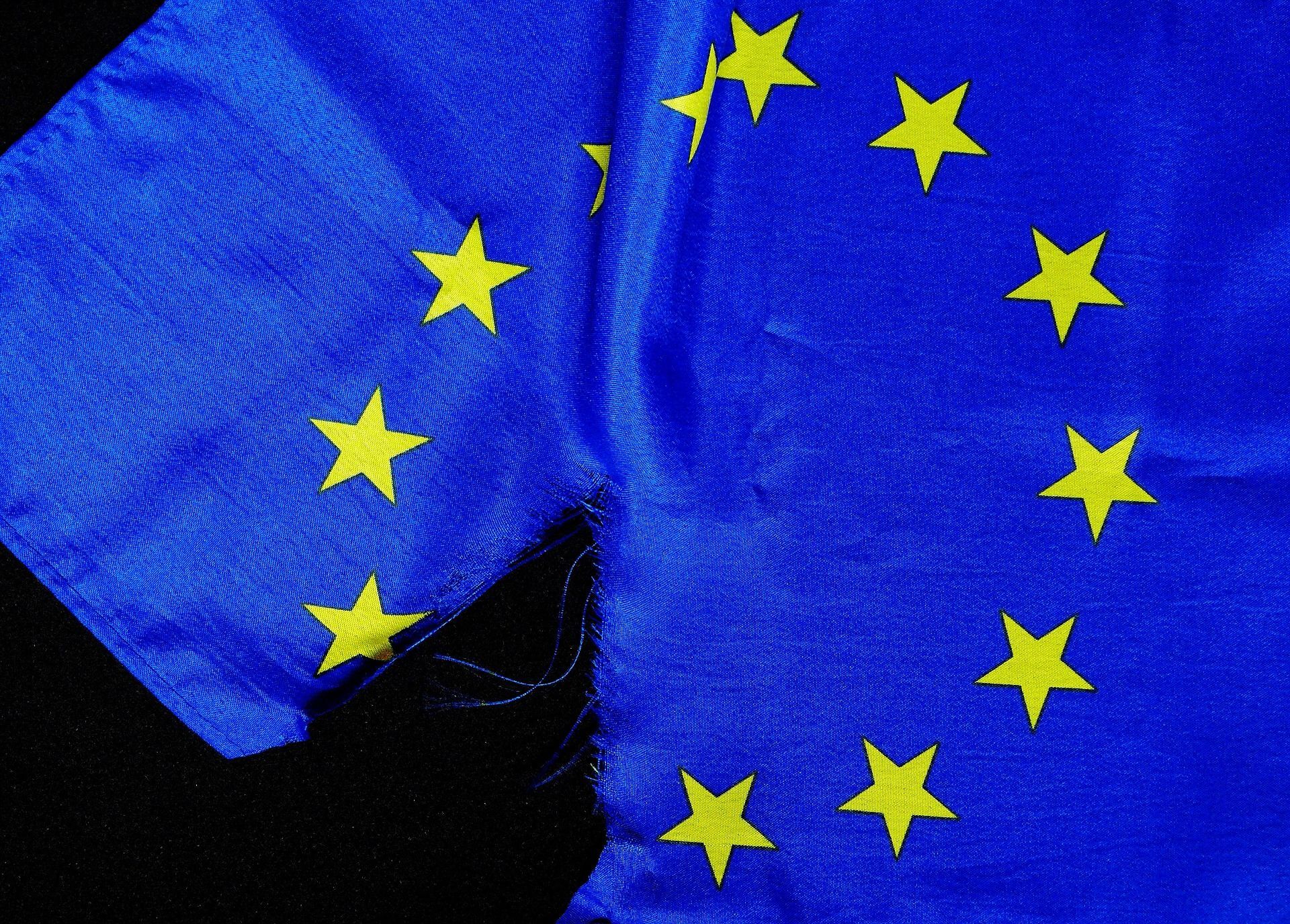EXCLUSIVE: EU Rejection of Ukraine Talks Was ‘Irritating Surprise’, Karin Kneissl Tells Sputnik
08:48 GMT 05.09.2022 (Updated: 18:49 GMT 05.09.2022)

© Sputnik / Grigory Sysoev
/ Subscribe
Exclusive
Former foreign minister of Austria Karin Kneissl, who has faced abuse over her ties with Russia and left her home country over death threats, has arrived in Vladivostok to attend the International Tiger Forum. On Monday, she sat for an exclusive interview with Sputnik to talk about Russia, Ukraine, the rise of Asia and her affection for animals.
Sputnik: Why did you choose to attend the Eastern Economic Forum and the Tiger Forum? Why is it important?
Karin Kneissl: The Eastern Economic Forum, as well as the Tiger Forum? Because they were so kind to invite me. Thank you very much. And I said, of course I'd come. But then I stepped back to the Tiger Forum.
I've been following the work of Tiger protection from a far distance and I'm somebody who is very fond of animals in general. I've got little tigers, cats, and foxes and ponies and chickens. So I'm somebody who lives with animals. And I'm very grateful for the company of my animals, the tigers, the 'tiger'.
Otherwise, (why did I visit) the Eastern Economic Forum as such? I've always wanted to come because in 2017 I published a book called The Changing of the Guard: From the Transatlantic to the Pacific World Order. I have always said, "the music is playing in the East." Europe can not continue to project the power it once had. I mean: this power projection finished in my eyes already with World War One, and the European Century was the long 19th century, as philosopher Eric Hobsbawm called it, from the French Revolution in 1789 till World War One. Then started the American century, especially after 1945, the Transatlantic century, which has now given space to the Asian century.
By the way, whether we'll really call it the Asian century remains to be seen. But what is definitely happening is a tectonic shift of commercial ties and of politics. It's not yet that political. It's more economic and commercial, but to what extent; (there's) an Asian vision of globalization, President Xi Jinping has been claiming in his speeches ever since 2017, at least, if I correctly remember. So something is happening.
Sputnik: As we see, Asia also had a different opinion on the events in Ukraine, the ASEAN countries, for example. Some of them have taken a stance of going strongly against the conflict and against Russia's involvement and imposing sanctions; Singapore was strongly against it. Meanwhile, other countries such as Indonesia were for a peaceful solution, but at the same time, they did not impose economic sanctions. Do you think there is more wisdom in the Asian approach to the problem?
Karin Kneissl: Well, if I take a country like Turkey, which I know quite well, and Turkish diplomacy, [Ankara] is one of the few real practitioners of diplomacy, President Erdogan said something very clear and important at the very beginning of the conflict. He said we have to find honorable exits, because situations were never solved by the defeated and the victorious; you know, you have to find some sort of compromise, some sort of clarification. And then you have diplomats who work on that, who try to find compromises.
Well, unfortunately, the European Union position has been formulated as of March. Decisions will be done on the battlefield and not at the negotiating table, which for me was quite a surprise, an irritating one, because the way I perceived the European Union, the way the common foreign and security policy has been formulated, it was always about a priority for diplomacy.
Sputnik: In your opinion, is Europe independent enough in what it's doing in the diplomatic field, or is it blindly following orders from Washington, from what you see?
Karin Kneissl: I must say when I was still a minister three years ago, I was more irritated by the absence of real political thinking and real dialog and real talking to each other, looking into each other's eyes than by US dominance. The US might have its role with certain countries because it's a bigger lender or whatever kind of relations.
But what I consider as the dilemma in the way we formulate our policy is that it's it's often done on a purely technocratic level, and there is no real political dimension to it. We we have abandoned conversation. It's also, of course, difficult to impossible at the figure of 27 (EU members), and even if there were only eight or 12, to sit around the table and really conduct a conversation. So this I see as the primary problem and not so much the US telling everybody what to do. We lost the craft, the basic skills of talking to each other and of formulating a truly political position.
Sputnik: But is there a dictate from Brussels to nation states within the European Union when it comes to foreign policy? Is there a lot of bureaucracy?
Karin Kneissl: Yes. It's a lot of technocratic lines to take: talking points, you know. I, of course, cherish the fact that (when) you have a meeting with your counterpart, there are certainly proper points that you definitely have to mention, and a position.
But we are reading out to each other talking points instead of having something like trust building. And this is missing, you know, reading out talking points - this is a very technocratic approach. And yes, there's definitely a big, big role by the European Commission in formulating these talking points. No doubt about that. It's done on an ambassadorial level, is done on a civil servant level, and many, many working groups, the many council preparatory meetings, and still it's it's a matter of human being in the role, trying to defend that position - and also on the domestic front, if I may say, and and this is not done any more.
Sputnik: In solving the problem of the conflict in Ukraine, you've mentioned that Europe from the very beginning has taken a stance of forceful solution - a solution on the battlefields. In your opinion, what is the true solution to the Ukrainian problem as opposed to the battlefield? What has to be done, step by step? What can be done to alter the situation?
Karin Kneissl: I must admit that I am very much ignorant about the many, many layers as I just mentioned to colleagues from another channel beforehand. The analogy which I may take is the breaking apart of the Federation of Yugoslavia, the breakdown of of Bosnia, in particular, Bosnia and Herzegovina, which ended up as a very bloody 'brother war'. In the end, it was really a war, as we would say in German, bruderkrieg.
It's really a conflict within families, within a village, ethnic cleansing and so on. In 2014, actually, I read the book by Bulgakov, the White Guard. I only understood 40% of the book because it's very complicated. But I was struck by the fact that what Bulgakov wrote - I think he wrote it in 1920, in '21 he published - how close it was to the events of 2014. And that struck me in the sense that there is an unsolved historic case, this mix of perceptions, of historical obsessions maybe also, and this falls in line with national security policy goals, with NATO expansion, with geography as such, history, of course, human tragedies, human scars and the involvement of many, many others who shouldn't be there.

Russian forces take control of former kindergarten used by Ukrainian troops in the settlement of Alexandrovka, Kherson Region. August 15, 2022.
© Sputnik / Konstantin Mikhailchevsky
/ Sputnik: It was reported earlier that you had to leave the EU for a safer place because of the threats. You had to leave Austria and then probably France was about the same story. How does it correlate with Europe's adherence to human rights, the rule of law, freedom of speech, freedom of expression? Who are these people who are threatening you? And what are the authorities doing?
Karin Kneissl: The authorities aren't doing anything. No. I asked also for help. Once there was one word in favor of me. There were some people I don't know who wrote nice emails. That's it. But it's all about that, you know, preaching water and drinking wine, as you say. The threats coming from the Internet and social media, I don't consider them as so important. You know, they are nasty, but nobody who could threaten you with all kinds of stupid things would get up from his sofa and go all the way to really harm you.
What is much more harmful and what has an immediate impact on your daily survival is when you are not allowed to work anymore in your field, and that I realized already two years ago. That's why I quit in Austria. I had not a single contract I had signed, they were dissolved by political pressure, and I could not continue my work, which I wanted to do as an academic, I could not continue my teaching contracts and I had no income at all because as a former Cabinet member, you don't have any income.
So in 2019, 2020, I realized it's a problem and then followed the lockdowns, because in 2020 I still had a few contracts with Germany. The moment I started working for Russian institutions such as MGIMO and started writing for RT, I was the outcast, you know, and I was elected to the board of Rosneft in June 2021. That was two years after I had left government. It was not an immediate follow-up, as some claimed. I served on the board as somebody who knows the market. I was not moved in there as a completely ignorant person and I didn't step down in spring when all the pressure was there, because it's not my style to step down. But then all the events became more and more hectic. And that was the time, also in spring this year, that I realized that I was refused a bank account in France, with no reasoning.
My name is apparently on lists, which I don't know, and this makes your life very difficult. And that's what I keep saying. Lists have replaced laws, and this is the most important thing. On that I'm writing a book. I gave it a title: Requiem for Europe, because it's like an excommunication, you know, like in the Medieval ages. One of my favorite emperors was Frederick the Second. He was ruling in the 13th century. He was born in Sicily. He was very much more Italian than he was German. He was more than that - he was Mediterranean. He spoke proper Arabic, and he was definitely a very enlightened emperor. He was also excommunicated like some others; in those days, the excommunication was done by the Catholic Church. Today, the excommunication is done by the so-called society of values.

Austrian Foreign Minister Karin Kneissl addresses the media after talks with Czech Foreign Minister Tomas Petricek at the foreign ministry in Vienna, Austria, Thursday, Jan. 17, 2019
© AP Photo / Ronald Zak
Sputnik: In many EU countries, including Austria, there are parties with patriotic stance who are not anti-European, but are focused on national interests. Is it possible there will be awakening or a "revolution" and these parties will come to power?
Karin Kneissl: Well, I do hope that Europe will somehow be reinvented, reinvent itself, and Europe will not be gone. Europe disappeared many times throughout history, but it came back and it will come back, although I don't see revolutions as a solution. I mean, you had a revolution here in this country and you know all that it destroys and how much the impact on a society. I see. Much more of this array confusion, a lot of confusion
And you have very fragmented societies, much more fragmented than there were in the 1930s or twenties when we had the last time a very big economic crisis. Today's societies are fragmented on many levels family, social level, although the composition of the society in terms of a religion, in terms of ethnic origin. So this is this contributes to to a situation where, well, we see a lot of confusion, but I don't see something that you can probably call a revolution.



